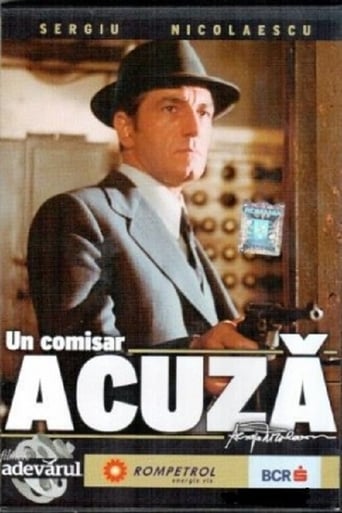mustspeed
Too long,Unrealistic scenesThis movie is about a case.Tudor Moldovan try to solve The enigma of the massacres from Jilava prison.Movie shows fake history, behind the story about the case movie shows the beginning of Communist movement from Romania but this movie don't shows the truth.it's a politic movie about Communist movement like many other Romanian movies.
romulussultan
Extremely long, boring, unrealistic, lying, silly, comical through its stupidness, typical Soviet machine propaganda "movie".I've barely watched it just to see how much more they can invent and misrepresent the reality, what really happened, how really was, the HISTORICAL TRUTH, for their own good, for the mass brain washing purposes.If you don't know anything about 1940 Romania and you'd like to know everything or at least a little bit, all you have to do is to reverse the nonsense shown here at a 180 degrees angle.Or to remember that this movie was made by the worst Communist dictatorship in Europe, representing a doctrine that killed between 120 and 160 million people...
Mihnea the Pitbull
For the time when it was shot, "Un comisar acuzä" was surprisingly well done, catchy and fast paced. Unfortunately, it was also paying tribute to the communist propaganda, depicting the Iron Guards as gorilla-type hoodlums, when everyone in Romania knows they were ascetic and cultured looking intellectuals and students, with a touch of religious and nationalist fanaticism (a bit closer to the truth are the portrayals in "Actorul si sälbaticii", although that's also a history-misshaping movie). In the same vein, Tudor Moldovan remains a cardboard character, with poorly disguised communist sympathies - and worse, the director's conformism becomes obvious in the useless scenes showing the communist illegal printing presses and leaflets, closed with the slogan: "Let's unite our forces around the Romanian Communist Party!" But, after all, who needs historical truth and political honesty in a James Bond-type movie about a super-commissioner? True to himself, Sergiu Nicolaescu brings again on screen ancient cars that crash all together, fly over each other like Baudelaire's Albatross and explode like as many fireworks... Gunshots galore, bullet-impact effects all over the cast, stunt-men, extras and sets, slow-motion shots with a touch of poetic sarcasm (by the way, the hotel stairway scene is a faithful copy-paste from John Milius' "Dillinger", with just two additions: two victims instead of one, and slow-motion). Kudos for the photography of Nicolae Girardi (uncredited; it was signed only by Alexandru David), for the nervous editing of Dan Naum, and mainly for the thrilling score by Richard Oschanitzky. All in all, a delicious piece of entertaining adventure.
andrei1981-1
During the communist era one had to be very cautious when talking about the old regime, and especially the "Iron Guard" or general Ion Antonescu. It is almost a miracle that Sergiu Nicolaescu was able to make a film set in the historical frame of the early 1940's. Although the Communist Party made different modifications into the initial script, adding scenes or lines praising the activity of the communists, the film remains a milestone in the history of Romanian cinematography and the historical events depicted are quite accurate. Perhaps the best thing now would be a director's cut where the scenes forcibly imposed by the Communist Party to be erased.



